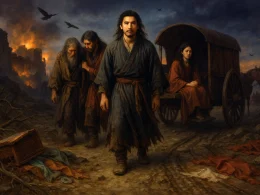When elders talked of bygone years,
Displeased, I would shut up my ears.
But fifty years have gone by now,
And time writes wrinkles on my brow.
I would recall youthful delight,
But I can find no pleasure slight.
Far, far away are bygone days.
Could I relive in olden ways?
To drink my fill I'd spare no gold;
I would keep pace with days grown old.
I'd leave no money for my sons;
There's no need if they're worthy ones.
Original Poem
「杂诗 · 其六」
陶渊明
昔闻长者言,掩耳每不喜。
奈何五十年,忽已亲此事。
求我盛年欢,一毫无复意。
去去转欲速,此生岂再值!
倾家持作乐,竟此岁月驶。
有子不留金,何用身后置!
Interpretation
Miscellaneous Poems VI was composed around 414 AD when Tao Yuanming was over fifty years old, reflecting deeply on life's impermanence and fleeting time during his rural seclusion. Having once dismissed elders' advice in his youth, the poet now personally understands the painful truth of "time never returning" through life's hardships. While lamenting time's relentless march, the poem blends philosophical detachment with liberation - containing both nostalgic regret and carefree attitudes of "seizing joy" and "leaving nothing behind" - demonstrating Tao's enlightened perspective on life's value in his later years.
First Couplet: "昔闻长者言,掩耳每不喜。"
Xī wén zhǎng zhě yán, yǎn ěr měi bù xǐ.
Elders' words I once heard,
Covering ears, disdaining what they referred.
Expresses youthful arrogance toward aging, implying retrospective self-reproach.
Second Couplet: "奈何五十年,忽已亲此事。"
Nài hé wǔ shí nián, hū yǐ qīn cǐ shì.
How could fifty years fly,
Now I face this truth eye to eye.
Transitions to present reality, acknowledging personal experience of aging.
Third Couplet: "求我盛年欢,一毫无复意。"
Qiú wǒ shèng nián huān, yī háo wú fù yì.
Seeking my prime's delight,
Not a shred remains in sight.
Reveals stark contrast between past joy and present emotional void.
Fourth Couplet: "去去转欲速,此生岂再值!"
Qù qù zhuǎn yù sù, cǐ shēng qǐ zài zhí!
Departing ever faster,
This life allows no sequel hereafter!
Intensifies urgency by comparing life to an irreversible journey.
Fifth Couplet: "倾家持作乐,竟此岁月驶。"
Qīng jiā chí zuò lè, jìng cǐ suì yuè shǐ.
Squandering wealth for pleasure,
Only hastens time's measure.
Ironically observes how revelry accelerates rather than halts time's flow.
Sixth Couplet: "有子不留金,何用身后置!"
Yǒu zǐ bù liú jīn, hé yòng shēn hòu zhì!
Leaving sons no gold store,
Why prepare for life no more?
Advocates virtuous poverty over material inheritance.
Holistic Appreciation
Centering on "prime years never returning," the poem's first half contrasts youthful arrogance with present aging through natural yet profound emotional transitions. From dismissing elders to personally experiencing aging, each line radiates unadorned authenticity. The latter section's apparent advocacy of revelry actually satirizes - even indulgence cannot stop time's flow, rendering pleasure ultimately hollow. Concluding with "leaving no gold" returns to transcendent detachment, embodying Tao's philosophy of "no worldly entanglement."
Artistic Merits
Using plain language, the poem progressively explores profound meditations on life, aging and value. Phrases like "covering ears," "facing personally" and "departing" create powerful situational expression with natural emotional progression. Concise yet philosophical, it combines acute time consciousness with spiritual transcendence. The classical allusion to "leaving no gold" (from Han Dynasty texts) enhances persuasive power and intellectual depth without artifice.
Insights
"Miscellaneous Poems VI" offers vital enlightenment: life is short, time fleeting, and youthful arrogance inevitably yields to time's awakening. Facing irreversible aging, we should emulate Tao Yuanming's clarity in seeing through worldly gains, focusing less on posthumous possessions than present spiritual fulfillment and moral legacy. Though lamenting time's passage, the poet meets aging with liberating equanimity, maintaining life's dignity through acceptance, modeling ideal character - "content in poverty, unresentful in old age."
Poem translator
Xu Yuanchong (许渊冲)
About the poet

Tao Yuanming(陶渊明), 365 – 427 CE, was a poet, literary figure, fu writer, and essayist active during the late Eastern Jin and early Liu Song dynasties. Born in Chaisang (near present-day Jiujiang, Jiangxi Province), he pioneered a new genre of pastoral-themed literature, expressing profound philosophical insights through simple language. His poetic style became an enduring aesthetic standard in classical Chinese poetry.












